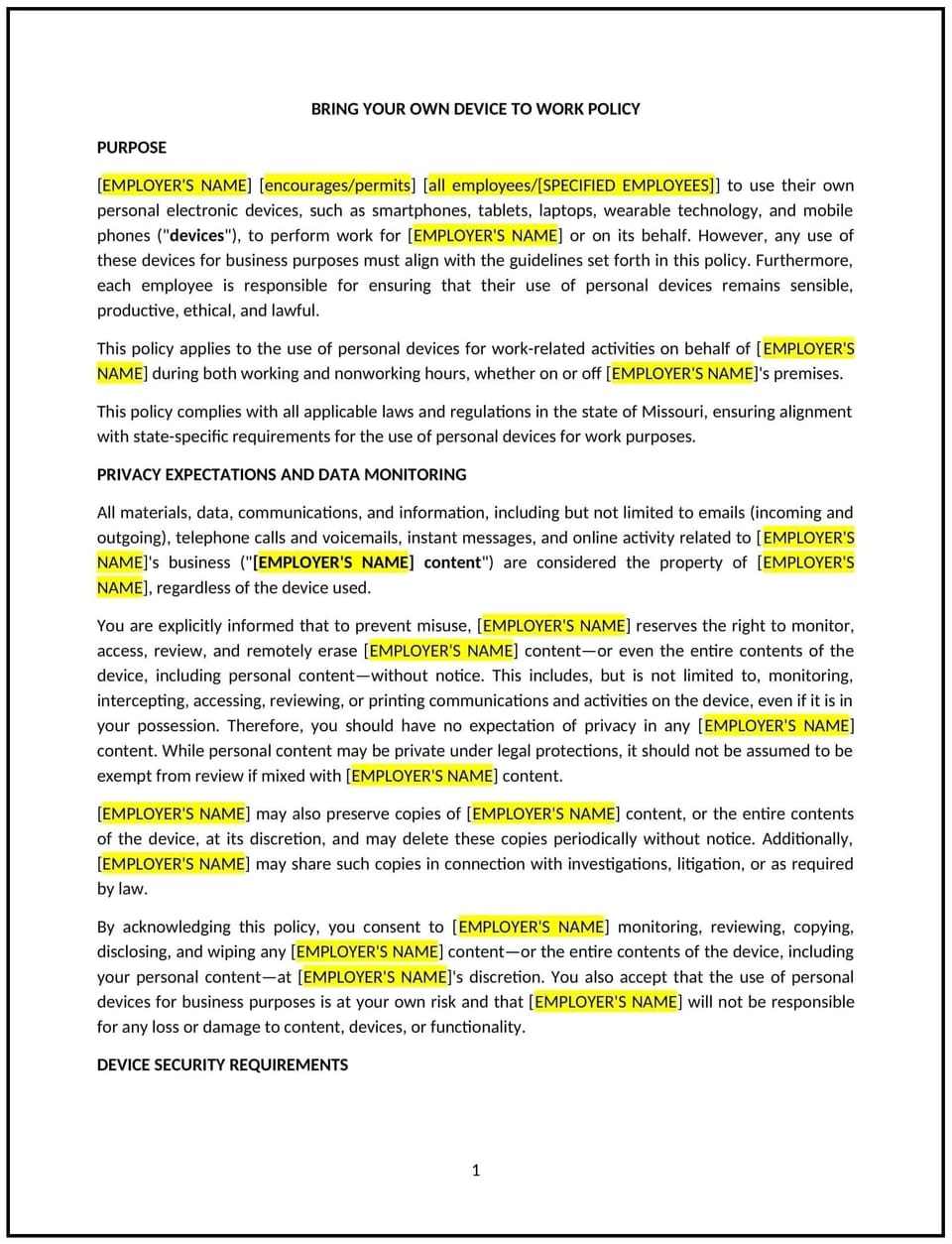Bring your own device to work policy (Missouri): Free template

Bring your own device to work policy (Missouri)
A bring your own device (BYOD) policy helps businesses in Missouri manage the use of personal devices, such as smartphones, laptops, and tablets, for work purposes. This policy outlines guidelines for safely integrating personal devices into the workplace while protecting company data and maintaining productivity. It is designed to balance the benefits of flexibility with the security needs of the business.
By implementing this policy, businesses in Missouri can support employee convenience, enhance efficiency, and minimize risks related to data security and privacy.
How to use this bring your own device to work policy (Missouri)
- Define acceptable devices: Clearly specify which types of devices (smartphones, laptops, tablets, etc.) are permitted for work purposes.
- Set security requirements: Require employees to follow specific security protocols, such as using strong passwords, enabling encryption, and installing antivirus software.
- Define acceptable usage: Outline how devices can be used during work hours, including restrictions on personal use during business hours and guidelines for accessing company data.
- Address data security: Establish procedures for handling sensitive business data on personal devices, including remote wiping, data encryption, and monitoring access.
- Implement reimbursement policies: If applicable, clarify whether employees will be reimbursed for device usage or if the company will cover any associated costs (e.g., software or data plans).
- Set guidelines for remote work: Define expectations for device usage when employees are working remotely or outside the office.
- Clarify responsibility for lost or stolen devices: Specify the steps employees should take if their device is lost or stolen and how they can prevent unauthorized access to company data.
- Communicate the policy: Make the policy easily accessible to all employees and ensure they are aware of the expectations and security measures in place.
- Review regularly: Regularly review and update the policy to keep up with technological advancements and any changes in Missouri law.
Benefits of using this bring your own device to work policy (Missouri)
This policy provides several advantages for businesses in Missouri:
- Increases flexibility: BYOD policies allow employees to use familiar devices, improving comfort and productivity.
- Reduces company costs: Businesses can save on purchasing devices, as employees use their own.
- Enhances employee satisfaction: Offering the option to use personal devices can lead to higher employee morale and retention.
- Improves productivity: Employees may be more efficient when using devices they are comfortable with.
- Protects company data: By setting clear security measures, businesses can protect sensitive data from unauthorized access or breaches.
- Supports remote work: A clear BYOD policy allows employees to remain productive even when working remotely, contributing to flexible work arrangements.
Tips for using this bring your own device to work policy (Missouri)
- Clearly communicate expectations: Ensure employees understand the security protocols and acceptable usage of their personal devices for work.
- Monitor compliance: Regularly check that devices meet security requirements and address any issues promptly.
- Offer security training: Educate employees on best practices for keeping their personal devices secure and safe from breaches.
- Be flexible: Consider offering employees options for device usage while balancing the company’s security needs.
- Stay up-to-date: Review and update the policy as new technologies emerge and when security threats evolve.
- Address potential conflicts: Clarify the responsibilities for both employees and employers in case of device damage, loss, or misuse.
Q: Why should businesses in Missouri adopt a bring your own device to work policy?
A: Businesses should adopt this policy to improve flexibility, reduce costs, and enhance productivity while maintaining control over data security and privacy.
Q: What types of devices should be allowed for work purposes?
A: Businesses should specify which types of personal devices (smartphones, laptops, tablets, etc.) are acceptable for use at work, based on company needs and security requirements.
Q: How can businesses ensure data security on personal devices?
A: Businesses should require employees to implement security protocols, such as strong passwords, encryption, and antivirus software, and may also implement remote wiping of devices if necessary.
Q: Should businesses reimburse employees for their devices or associated costs?
A: Businesses should clarify their policy on reimbursements, specifying whether they will cover the costs of software, apps, or data plans for employees using personal devices for work.
Q: How should businesses handle lost or stolen devices?
A: Businesses should establish clear procedures for employees to follow if their device is lost or stolen, including steps for reporting the incident and securing company data.
Q: Can employees use their personal devices for personal activities during work hours?
A: Businesses should outline acceptable usage for personal devices during work hours, specifying any limitations on personal use to maintain productivity.
Q: How often should businesses review the BYOD policy?
A: Businesses should review the BYOD policy regularly to ensure it remains relevant and effective, reflecting technological advancements and any changes in Missouri law or business practices.
This article contains general legal information and does not contain legal advice. Cobrief is not a law firm or a substitute for an attorney or law firm. The law is complex and changes often. For legal advice, please ask a lawyer.


